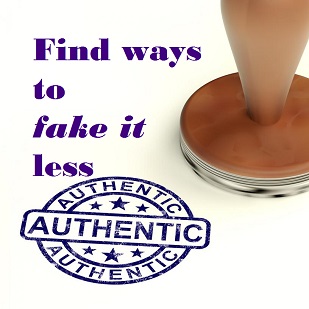This post is part of our Weekly Tips series.

I caught myself faking it last week. She who prides herself on “getting real.”
It was—what shall I call it—an unexpected kind of morning on the heels of very little sleep for a lot of people (myself included) as a result of watching U.S. election returns until the wee hours.
During my first call of the day, a client I don’t yet know very well initiated the usual pleasantries, asking, “How are you?” Without even thinking, I said, “I’m great! How are you?” It was immediately clear he wasn’t great. Truth be told, neither was I. Only I wasn’t telling the truth.
But I wasn’t exactly telling a lie, either—at least not deliberately. I was just on auto-pilot. It’s what I pretty much always say when someone asks me how I am. Sometimes it’s an accurate answer; sometimes it’s a declaration to boost my mood; mostly it’s a reflex.
When I realized the disconnect between my answer and my reality (and my client’s), I said, “Wow, listen to me saying ‘great,’ on auto-pilot. That’s not a very accurate word.” My client proceeded to open up a bit about how he was feeling that morning.
[Tweet “We might all benefit from finding ways to fake it less when we’re chit-chatting. https://thegetrealproject.com/?p=4676 #getreal #communication”]
Thirty minutes later, this time on a call with a long-time colleague, I fell into the exact same trap. “Really?” I thought to myself. So I fessed up again: “You know, this is the second time this morning that I’ve caught myself giving an answer I don’t really mean.”
As the day progressed, I found more authentic answers to the “How are you” question. My two favorite replies to people I didn’t know very well, or people I knew (or suspected) were having a different kind of day:
- “I’m sleep-deprived.”
- “You know, I’m not sure how to answer that today.”
I like these responses better because they’re honest without being insensitive or unnecessarily provocative.
It’s not that I’m against meaningful dialogue about charged issues, or even against social pleasantries—there’s most certainly a time and a place for both. It just seems like we might all benefit from finding ways to fake it less when we’re chit-chatting, and thereby build faster connections with people that pave the way for more meaningful dialogue.
Make It Real
This week, discover your auto-pilot answers to questions like, “How are you?” and look for opportunities to respond more authentically.
Learn More

Read more about “reciprocal pleasantries,” from our friends at Trusted Advisor Associates, or brush up on how to accelerate trust in Chapter 21 of The Trusted Advisor Fieldbook.
Andrea Howe
Latest posts by Andrea Howe (see all)
- Why choosing silence in the face of awkwardness can be a trust tragedy - March 21, 2024
- What NOT to do when you think you’re being ghosted - February 21, 2024
- Reprise: If you’ve resolved to have better client relationships this year, great, now ditch your resolution - January 2, 2024

Hi Andrea,
Really like this observation – catching ourselves in the habit of going on auto-pilot where we can be less than authentic. I can see how this innocent habit can lead us away from cultivating “Intimacy” in our business relationships. I’ve found Trusted Advisor’s appreciation of the role that Intimacy contributes to building trust to be extremely helpful and am continuing to reap benefits by attending to this factor.